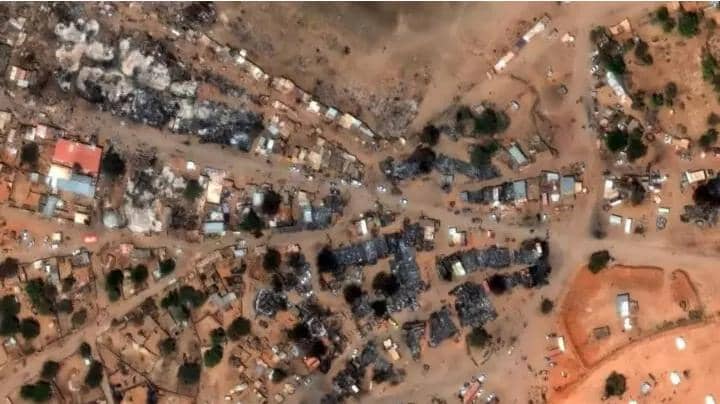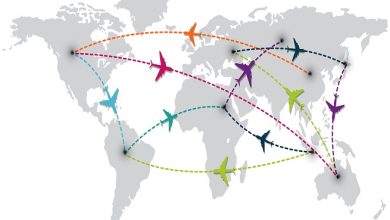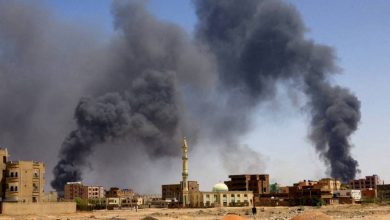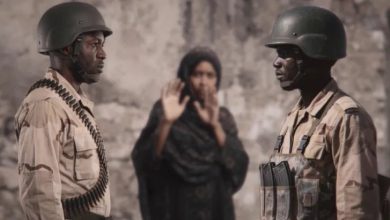33 Killed in (RSF) Attacks in Western and Central Sudan

Sudan Events – Agencies
Thirty-three people, including 14 members of a single family, were killed in attacks attributed to the Rapid Support Forces (RSF) targeting a displacement camp in Sudan’s western Darfur region and a prison in North Kordofan State in central Sudan, amid escalating clashes with the army, which carried out airstrikes on military equipment and storage facilities.
The war between the army and RSF, now ongoing for more than two years, has intensified recently, with both sides resorting to long-range weapons to strike each other’s strongholds.
A “heavy artillery shelling” by the RSF on Friday evening targeted Abu Shouk camp for displaced people in El Fasher, the capital of North Darfur State, killing 14 members of one family and injuring others, according to a statement by the Abu Shouk Emergency Room on Saturday.
In North Kordofan State, 19 inmates were killed and 45 wounded in a missile strike carried out by an RSF drone on El-Obeid prison, according to a medical source at the city hospital. The source told AFP that the dead were taken to El-Obeid hospital, while the injured were receiving treatment in El-Obeid and Al-Dhaman hospitals.
The government aligned with the army condemned the prison attack, describing it as a “full-fledged war crime.” Government spokesperson Khaled Al-Ayesir posted on X (formerly Twitter), “We strongly condemn this terrorist act.”
Separately, the Sudanese government warned that RSF drone attacks on oil infrastructure might halt oil exports from both Sudan and South Sudan. On Saturday, Sudan’s Undersecretary of the Ministry of Energy and Oil sent a letter to his South Sudanese counterpart informing him that a drone strike on Friday morning had caused severe damage to a pumping station in the Al-Hudi area, raising the risk of halting export operations significantly.
The letter also mentioned another drone strike on Thursday that targeted a fuel depot in White Nile State, which Sudan’s Babco company relied on for its operations.
South Sudan depends on Sudanese infrastructure to export its oil under a trade agreement between the two countries.
Sudan resumed oil export operations earlier this year after suspending them when the war broke out in 2023.
Army Airstrikes
The RSF has increasingly relied on drones and long-range weapons to strike army positions in areas previously considered relatively safe and located far from RSF strongholds.
The army-aligned government accuses the United Arab Emirates of supplying weapons to the RSF, an allegation denied by Abu Dhabi.
Amnesty International published a report on Thursday accusing the UAE of supplying the RSF with Chinese-made weapons, including “GP50A guided bombs and AH-4 shells,” based on analysis of remnants found after attacks in Khartoum and Darfur. The UAE “strongly rejected” these accusations.
Conversely, the army has increasingly relied on its air force and fighter jets. On Saturday, it launched airstrikes on RSF positions in the cities of Nyala and El-Geneina in Darfur, destroying weapons and military equipment depots, according to a military source.
The source, speaking anonymously, said, “Sudanese Air Force jets attacked RSF militia positions in Nyala (capital of South Darfur State) and El-Geneina (capital of West Darfur), destroying weapons and equipment the militia intended to use for hostile operations.”
“Between Shell and Shell”
A witness in Nyala reported that “army planes targeted the city’s airport and other internal sites,” adding that “the explosions were extremely loud.”
In El-Geneina, residents heard “explosions coming from the direction of the airport and saw rising smoke,” according to another witness.
The RSF has intensified its attacks on Darfur in recent weeks, killing dozens and displacing hundreds of thousands from camps such as Abu Shouk and Zamzam in El Fasher.
RSF attacks on Zamzam camp, which housed nearly one million people, have driven out most residents, leaving it “nearly empty,” according to the United Nations.
The El Fasher Resistance Committees documented over 750 projectiles—“including mortars, rocket launchers, tanks, and heavy artillery”—fired in the last week of April, calling it a “bloody massacre against the unarmed residents of El Fasher.”
On Saturday, the committees said that shelling on El Fasher continued “daily and indiscriminately,” leaving civilians “living between one shell and the next, not knowing what the next hour might bring.”
El Fasher holds strategic importance in the war as the only major city in Darfur not under RSF control. The RSF is besieging and attacking its outskirts.
The United Nations and international monitors have warned of possible large-scale atrocities.
The escalation in western and central Sudan follows unprecedented RSF drone attacks in recent days on the eastern city of Port Sudan, the government’s temporary headquarters since the war began. Many international organizations, diplomatic missions, and hundreds of thousands of displaced people have relocated there.
The attacks disrupted vital facilities, including the main fuel depot, power station, Port Sudan’s seaport, and its international civilian airport, which the UN described as a “lifeline for humanitarian operations.”
Since April 2023, the war has divided Sudan into areas of control between former allies: army commander Abdel Fattah al-Burhan and RSF leader Mohamed Hamdan Dagalo. The former controls central, eastern, and northern Sudan, including most of the capital, while the latter controls most of Darfur and parts of the south.
The conflict has killed tens of thousands of civilians, displaced 13 million people, and created what the UN calls one of the worst humanitarian crises in modern history.



